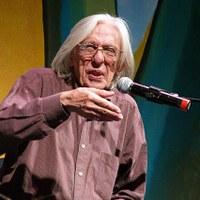São Luís, 1930 – Rio de Janeiro (Brasil), 2016
By Flávio Aguiar
The story of this poet, translator, essayist, painter, and journalist portrays the Brazilian reality at the end of the 20th century. He debuted with the book of poems A luta corporal (1954), which placed him alongside the concrete poet Haroldo de Campos, Mário Chamie, and José Paulo Paes.
Shortly after, in 1956, he broke away from concrete poetry and defined new directions for the avant-garde, resulting in the Neoconcrete Manifesto, also signed by visual artists Lygia Clark and Amilcar de Castro. From his appointment, in 1961, as director of the Brasília Cultural Foundation, he reviewed the experimentalism that had marked his work until then and embraced engaged literature with cordel texts such as Cabra marcado pra morrer.
He proposed the creation of the Museum of Popular Art and joined the Popular Culture Center of the National Union of Students (UNE), of which he was president in 1963. From then on, he produced work with social significance like Thiago de Melo, not ignoring the need for intellectuals to engage in national political life. He worked as an editor at the Rio de Janeiro branch of O Estado de S.Paulo.
He joined the Communist Party on the day of the military coup, April 1st, and founded the Opinião Group with Oduvaldo Vianna Filho and his first wife, Thereza Aragão. In 1968, the play he wrote with Dias Gomes, Dr. Getúlio, sua vida e sua glória, was staged, which led to his imprisonment by the repression agencies alongside Paulo Francis. He lived in exile until 1977, and in 1975, while in Argentina, he wrote one of his main works: Poema sujo. From his time of activism in Brazil, his most important essays are “Cultura posta em questão” and “Vanguarda e subdesenvolvimento,” reissued in 2002.
Maintaining his reputation as a revolutionary of letters, in 1993 he stirred controversy with the book Argumentação contra a morte da arte. In 2002, he was nominated for the Nobel Prize and received the Prince Claus Award from the Netherlands for having contributed to changing Brazilian society, art, and cultural vision. Other works include Toda poesia (1980); O menino e o arco-íris (2001).
In 2010, he was honored with the Camões Prize. In 2011, he won the Jabuti Prize with the poetry book Em alguma parte alguma. In 2014, he took chair 37 at the Brazilian Academy of Letters. He passed away on December 4, 2016, in Rio de Janeiro, at the age of 86.



